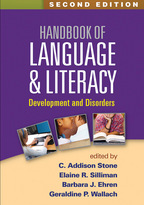Handbook of Language and Literacy
Second Edition
Development and Disorders
Edited by C. Addison Stone, Elaine R. Silliman, Barbara J. Ehren, and Geraldine P. Wallach
1. Atypical Language and Literacy Development: Toward an Integrative Framework, C. Addison Stone and Julie E. Learned
2. Genetics of Language and Literacy Impairments, Jeffrey W. Gilger
3. Neurobiological Basis of Language and Reading: Typical and Impaired Processing, Maria Mody and Joanna A. Christodoulou
4. Cognitive Processes Underlying Typical and Atypical Second-Language and Literacy Development, Kathleen F. Peets
5. In the Service of Questions: From Mixed-Methods to Question-Based Integrative Designs in Social Research, Elizabeth Birr Moje
II. The Political and Social Contexts of Language and Literacy Acquisition
6. Policy and Practice Issues for Students at Risk in Language and Literacy Learning: Back to the Future, Elaine R. Silliman and Louise C. Wilkinson
7. Reframing Literacy for a Screen-Based Age: A Case for Digital Mindsets, Claire Wyatt-Smith and Kay Kimber
8. Becoming Bilingual and Biliterate: Sociolinguistic and Sociopolitical Considerations, Ofelia García
9. The Case for Increasing Emphasis on Vocabulary Instruction in the Early Years, Susan B. Neuman and Tanya S. Wright
10. Social and Affective Factors in Children with Language Impairment: Implications for Literacy Learning, Bonnie Brinton and Martin Fujiki
11. Fostering Children’s Emergent Literacy Development: The Role of Family Practices, Christina Yeager Pelatti, Laura M. Justice, Jill M. Pentimonti, and Mary Beth Schmitt
12. Language Variation and Literacy Learning: The Case of African American English, Julie A. Washington, Nicole Patton Terry, and Mark S. Seidenberg
III. Language Processes Underlying Atypical Literacy Learning: Complementary Perspectives
13. Phonological Processing Deficits and Literacy Learning: Current Evidence and Future Directions, Gary A. Troia
14. Individual Differences in Word Learning and Reading Ability, Suzanne M. Adlof and Charles A. Perfetti
15. Morphemes Matter: How Morphological Knowledge Contributes to Reading and Writing, Joanne F. Carlisle and Amanda P. Goodwin
16. Syntactic Contributions to Literacy Learning, Cheryl M. Scott and Nicole M. Koonce
17. The Linguistic Challenges of Learning across Academic Disciplines, Zhihui Fang, Mary J. Schleppegrell, and Jason Moore
18. Perspective-Taking and Reading Comprehension of Narratives: Lessons Learned from The Bean, Mavis L. Donahue
19. A Language Perspective on Executive Functioning, Metacognition, and Self-Regulation in Reading, Carol E. Westby
20. Bilingual Children with Language Learning Disabilities: Convergence in Conceptual, Linguistic, and Cultural Circles of Knowledge, María Brea-Spahn
IV. Addressing the Needs of Individuals with Language and Literacy Challenges
Word Recognition
21. Developmental Variation in Reading Words, Linnea C. Ehri, Cláudia Cardoso-Martins, and Julia M. Carroll
22. Word Recognition Assessment Frameworks, Froma P. Roth
23. Teaching Students with Reading Disability to Read Words, Rollanda E. O’Connor and Sean J. Davidson
Reading Comprehension
24. Difficulties with Reading Comprehension, Nell K. Duke, Kelly B. Cartwright, and Katherine R. Hilden
25. Assessment of Reading Comprehension, Janice M. Keenan
26. The Spoken-Written Comprehension Connection: Constructive Intervention Strategies, Geraldine P. Wallach, Stephen Charlton, and Julie Christie Bartholomew
Writing Composition
27. Developmental Variations in the Production of Written Text: Challenges for Students Who Struggle with Writing, Julie E. Dockrell
28. Classroom-Based Writing Assessment, Nickola Wolf Nelson
29. Learning and Instruction in Writing, Gert Rijlaarsdam, Tanja Janssen, Martine Braaksma, Elke Van Steendam, Kris Van den Branden, Michel Couzijn, and Lieve Verheyden
Spelling
30. Spelling Development and Disability in English, Derrick C. Bourassa, and Rebecca Treiman
31. Spelling Assessment Frameworks, Julie J. Masterson and Kenn Apel
32. Spelling: Instructional and Intervention Frameworks, Julie A. Wolter and Katie Squires
Special Considerations
33. Adolescents Who Struggle and 21st-Century Literacy, Barbara J. Ehren, B. Keith Ben Hanania Lenz, and Donald D. Deshler
34. Response to Intervention for Teaching and Learning in Language and Literacy, Karen K. Wixson, Marjorie Y. Lipson, and Sheila W. Valencia
35. English Language Learners: Instructional Practices to Promote Literacy Development, Lucinda Soltero-González, Janette K. Klingner, and Edilberto Cano-Rodríquez



